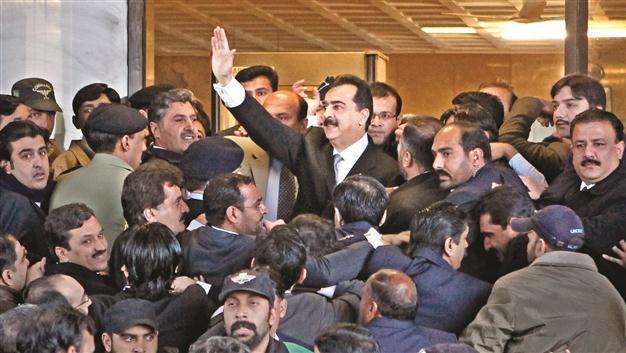Pakistan tensions rise as PM indicted
ISLAMABAD

Pakistan’s Prime Minister Yousuf Raza Gilani (C) waves after arriving at the Supreme Court in Islamabad. The court charged Gilani with contempt of court. Reuters photo
The Supreme Court charged Pakistan’s prime minister with contempt yesterday for defying its order to reopen an old corruption case against the president, strengthening the hand of the powerful military, which has staged three coups since 1947.Prime Minister Yousuf Raza Gilani pleaded not guilty. If convicted, he could be imprisoned and will likely lose his job. But analysts said the premier seems willing to sacrifice himself for the benefit of his party and his political ally, President Asif Ali Zardari. One of the judges, Nasirul Mulk, read out the contempt charge, saying Gilani had “willfully flouted, disregarded and disobeyed the directions of this court.”
The prime minister, who was surrounded by his Cabinet members and coalition partners, said he understood the charge and would contest it. The move was the formal start to a process that will take months or weeks to conclude. Proceedings will start on Feb. 16 when the prosecution will submit its evidence. The next session will be on Feb. 22.
Court supporters have applauded the judges for upholding the rule of law. But government loyalists
accuse the chief justice of pursuing a personal vendetta against president, or of acting on behalf of the army to topple the government. Supporters of government believe that the Supreme Court’s pursuit of Zardari and his Pakistan People’s Party (PPP) is bad for democracy and military, which ruled the country for more than half of its history, will benefit from it.
The civilian-judicial confrontation stems from thousands of old corruption cases thrown out in 2007 by an amnesty law passed under former military president Pervez Musharraf. Zardari is its most prominent beneficiary and the main target of the court, which voided the law in 2009 and ordered the re-opening of cases accusing the president of money laundering using Swiss bank accounts.
Gilani and his advisers have refused to ask the Swiss to reopen the cases, citing the president’s constitutional immunity as head of state. The prime minister had appealed against the court’s decision to charge him with contempt, but that appeal was dismissed, paving the way for Monday’s indictment.
Compiled from AP and Reuters stories by the Daily News staff.
Compiled from The Associated Press and Reuters by the Daily News staff
















